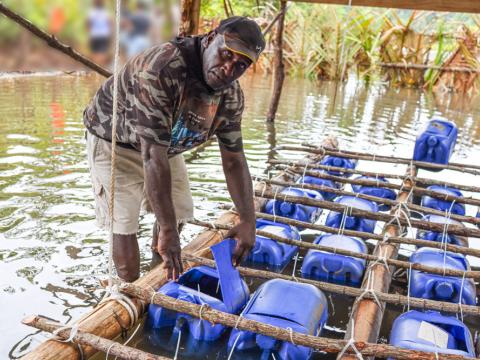Transforming Youth Lives: The Impact of the Lukautim Mama Graun Project

In the heart of Central Bougainville, nestled among the lush greenery and coastal beauty of Rorovana 1, a quiet but powerful transformation is taking place. For years, youth in this remote community have faced limited opportunities, often turning to homebrew and drugs as a way to cope with unemployment and lack of direction. But today, thanks to the Lukautim Mama Graun Project, funded by the Government of New Zealand (MFAT) and implemented by World Vision Papua New Guinea, the tide is turning.
The Lukautim Mama Graun Project is a pilot initiative designed to build climate resilience, protect ecosystems, and support sustainable livelihoods in targeted Evo-Torau communities, including Tarara, Vito, Rorovana 1, Rorovana 2, and Rorovana 3. While its goals are broad and ambitious, its most profound impact is being felt at the grassroots level especially among the youth.
One of the most inspiring stories comes from Rorovana 1, where a group of young men have found new purpose through the Crab Farming Project, a sub-initiative under the Lukautim Mama Graun umbrella. At the center of this movement is Xavier Kehali, a passionate and determined youth leader who has become a beacon of hope for his peers.
“This is a pilot project,” Xavier explains, “and we know life is short. There’s so much to do, and we want to make the most of the knowledge and support we’ve received from World Vision.”
Xavier leads a team of young men who have committed themselves to building and maintaining a crab nursery cage, a sustainable aquaculture system that not only provides income but also teaches valuable skills in environmental stewardship and business management. The project has sparked a wave of interest among local youth, many of whom were previously disengaged or involved in risky behaviors.
“Before this project, most of us had nothing to do,” says one of the youth participants. “We were just hanging around, drinking homebrew, getting into trouble. But now, we have something to focus on. We’re learning, we’re working together, and we’re building something that can last.”
The crab farming initiative is more than just a livelihood project it’s a catalyst for change. It has shifted mindsets, restored hope, and created a sense of ownership and pride among the youth. The physical act of constructing the crab nursery, caring for the crabs, and planning for future expansion has instilled discipline and teamwork. It has also opened doors for conversations about climate change, marine conservation, and sustainable development.
World Vision’s role has been instrumental. Through training sessions, mentoring, and ongoing support, the organisation has empowered young leaders like Xavier to take charge of their futures. The project also emphasizes community ownership, ensuring that the knowledge and skills gained are retained locally and passed on to future generations.
“We’re not just building a crab farm,” Xavier says. “We’re building a future. We’re showing the younger boys that there’s a better way.”
The impact of the Lukautim Mama Graun Project extends beyond Rorovana 1. In neighboring communities like Tarara and Vito, similar initiatives are taking root each tailored to the unique needs and strengths of the local population. Whether it’s reforestation, eco-tourism, or sustainable agriculture, the project is creating a ripple effect of positive change.
In Rorovana 1, the crab project has also sparked interest from local leaders and elders, who now see the youth as valuable contributors to community development. This shift in perception is critical, as it fosters intergenerational collaboration and strengthens the social fabric of the village.
Despite the success, challenges remain. The crab nursery is still in its early stages, and the team faces logistical hurdles, such as access to materials, technical expertise, and market connections. But the spirit of resilience is strong.
“We know it won’t be easy,” Xavier admits. “But we’re ready. We’ve come this far, and we’re not turning back.”
Looking ahead, the youth of Rorovana 1 are already planning the next phase of the project. They hope to expand the nursery, improve the design of the cages, and eventually establish a supply chain that connects them to buyers in nearby towns and even international markets. With continued support from World Vision and MFAT, these dreams are within reach.
The story of Rorovana 1 is a testament to what can happen when communities are given the tools, knowledge, and support to lead their own development. It’s a story of transformation, not just of livelihoods, but of lives.
As the sun sets over the coastline of Central Bougainville, the crab nursery glows with promise. Young men who once wandered aimlessly now gather with purpose, tending to their crabs, planning their future, and inspiring others to follow their lead.
Thanks to the Lukautim Mama Graun Project, the youth of Rorovana 1 are no longer just surviving, they are thriving.